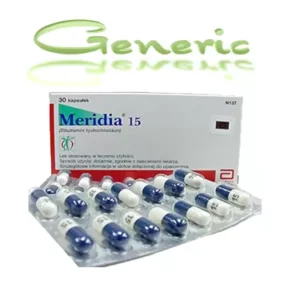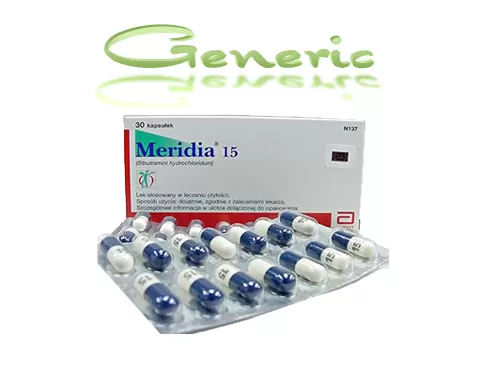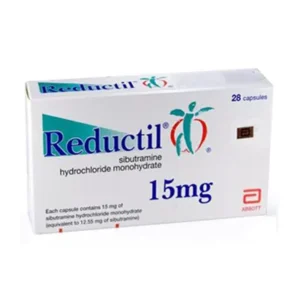Introduction
The battle against excess weight and obesity is a journey that many individuals embark on in their pursuit of a healthier, more fulfilling life. While diet and exercise are the cornerstones of weight management, they may not always yield the desired results for everyone. In such cases, prescription medications like Meridia 15 mg, also known as sibutramine, have provided a viable option. In this comprehensive guide, we will delve into the world of Meridia 15 mg, understanding its uses, benefits, potential risks, and the importance of informed and responsible usage.
Understanding of Meridia
Meridia is a brand name for sibutramine, a prescription medication used to assist individuals in managing their weight. It falls within the category of appetite suppressants, which means it primarily works by reducing one’s appetite, making it easier for them to consume fewer calories and thereby facilitating weight loss. Unlike over-the-counter supplements that claim to help with weight management, it’s prescription is that administered and monitored by healthcare professionals.
How Meridia Work?
This is a primary mechanism of action revolves around its impact on neurotransmitters in the brain, particularly serotonin and norepinephrine. These neurotransmitters are involved in regulating mood and controlling appetite. Meridia works by increasing the levels of serotonin and norepinephrine in the brain, leading to a sense of fullness and satisfaction with smaller food portions, thus reducing overall calorie intake.
Benefits of Meridia 15 mg
- Effective Weight Loss: One of the most significant benefits of Meridia is its proven ability to aid in weight loss. It can be particularly valuable for individuals who have faced difficulties losing weight through traditional methods such as diet and exercise alone.
- Appetite Control: Meridia is well-known for its appetite-suppressing effects, making it easier for individuals to adhere to a reduced-calorie diet and avoid overeating.
- Improved Cardiovascular Health: Weight loss achieved with Meridia often leads to improvements in cardiovascular health. This includes reduced risk factors such as high blood pressure and high cholesterol levels.
- Diabetes Management: For individuals with obesity-related type 2 diabetes, weight loss through Meridia can improve blood sugar control.
- Psychological Well-being: Achieving weight loss goals can significantly boost self-esteem and overall psychological well-being.
- Sustained Weight Loss: Studies have shown that Meridia can help individuals maintain their weight loss over time, as long as they continue to make healthy lifestyle choices.
Side effects of Meridia
While Meridia offers significant benefits, it is vital to be aware of its potential risks and side effects. It is not suitable for everyone, and its use should be closely monitored by a healthcare provider. Here are some potential risks and side effects associated with Meridia:
- Cardiovascular Risks: Meridia has been linked to an increased risk of cardiovascular events such as heart palpitations, increased heart rate, and high blood pressure. Due to these risks, it was withdrawn from the market in several countries, including the United States and the European Union.
- Elevated Blood Pressure: Meridia can raise blood pressure in some individuals. Regular monitoring of blood pressure is necessary while taking this medication.
- Insomnia: The stimulant effects of Meridia can lead to difficulty falling asleep or staying asleep.
- Nervousness and Anxiety: Some individuals may experience heightened feelings of anxiety, nervousness, or irritability while taking Meridia.
- Dry Mouth: Dry mouth is a common side effect of Meridia, which can be managed by staying hydrated.
- Digestive Issues: Meridia may cause digestive problems such as constipation or diarrhea.
- Dizziness and Lightheadedness: Feeling lightheaded or dizzy can be a side effect, especially when standing up quickly.
- Mood Changes: In some cases, Meridia may lead to mood swings or depression.
- Addiction and Dependence: While Meridia is not typically considered highly addictive, some individuals may develop psychological dependence on the medication.
- Tolerance: Over time, some individuals may develop tolerance to the appetite-suppressing effects of Meridia, making it less effective.
Use of Meridia
The use of Meridia should be approached with caution and under the supervision of a healthcare provider. Here are guidelines for responsible and informed use of Meridia:
- Prescription and Medical Evaluation: Meridia is available by prescription only. It should be prescribed by a healthcare provider who has evaluated your health, medical history, and the appropriateness of the medication for your specific situation.
- Regular Monitoring: Regular check-ups, including monitoring your weight, blood pressure, and overall health, are essential while taking Meridia. This helps to detect and address potential issues promptly.
- Diet and Exercise: Meridia is most effective when combined with a reduced-calorie diet and regular physical activity. It should not be considered a standalone solution to weight loss.
- Adherence to Dosage: It is crucial to take Meridia exactly as prescribed by your healthcare provider. Do not alter the dosage without consulting them.
- Inform Your Healthcare Provider: Keep your healthcare provider informed of any side effects or changes in your health while taking Meridia.
- Cautious Use with Other Medications: Inform your healthcare provider of all other medications and supplements you are taking, as drug interactions can occur.
- Withdrawal: When discontinuing Meridia, it should be done under the guidance of a healthcare provider to minimize potential withdrawal symptoms.
- Healthy Lifestyle Choices: Weight loss is most sustainable when accompanied by a commitment to long-term healthy eating and exercise habits.
Conclusion
Meridia 15 mg, or sibutramine, is a prescription medication that can be effective for individuals struggling with obesity to achieve their weight loss goals. However, it comes with potential risks and side effects, especially those related to cardiovascular health. Its use should be carefully considered and monitored by a healthcare provider, and it should always be part of a comprehensive weight loss strategy that includes a reduced-calorie diet and regular physical activity.










